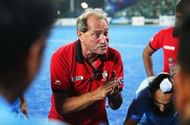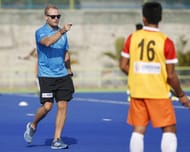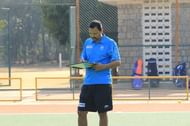On September 8, 2017, Hockey India made an announcement that catapulted the game to the national headlines. A new coach would be taking charge of the Indian men's team in place of Roelant Oltmans. The replacement? Sjoerd Marijne, coach of the Indian national women's team.
On May 1, 2018, Hockey India made yet another decision that took the sporting fraternity by storm, even amidst the crescendo of the Indian Premier League. A new coach would be taking charge of the Indian men's team in lieu of Sjoerd Marijne. The replacement? Harendra Singh, coach of the Indian national women's team.
Welcome to the chaotic, uncertain, and seemingly illogical world of Indian hockey!
But, we are not done yet. Quite inexplicably, Sjoerd Marijne is back where he started his India journey. The Dutchman will be in charge of the woman's team once again.
But, surely there has to be at least a semblance of sanity lurking in a corner in such a world too?
Why was Roelant Oltmans sacked?
Sjoerd Marijne may have been the 24th coach in the last 20 or so years to be replaced, but let's keep the history and the numbers aside for a moment and focus on why the Dutchman was appointed in the first place.
Roelant Oltmans was by far the most successful coach the Indian men have had for a while now. Following India's last-place finish in the 2012 London Olympics, Oltmans came in as high-performance director and was subsequently appointed coach after fellow Dutchman Paul Van Ass was shown the door in less than five months.
Under Oltmans, Indian hockey scaled new heights and broke into the top 6 in the world. India won silver in the prestigious Champions Trophy in 2016, going down fighting to mighty Australia in a penalty shootout. India also won silver in the Azlan Shah Cup in 2016, losing to Australia in the final. Why then was Oltmans sacked?
India beat Pakistan 7-1 in the Hockey World League Semi-Finals in London last year but went on to lose to Malaysia and Canada in the same tournament.

David John, Hockey India's high-performance director had this to say after the tournament: "Our performances were inconsistent. Unfortunately, we either need to change the whole playing group, or as often is the case, the chief coach is the one who suffers. In this case, we look for a new direction by getting a new coach.”
Hockey India officials went on to say that Oltmans had a long-term vision, but that the federation wanted immediate results and podium finishes in every tournament. The solution was to replace Oltmans with yet another Dutchman, Sjoerd Marijne.
Why then, did Hockey India approve of a young and inexperienced team to represent the country at the Azlan Shah Cup, knowing quite well that it would be next to impossible for the fledgelings to win a medal at Ipoh where Australia and England had fielded their best squads?
Long-term versus short-term objectives
When Sportskeeda asked coach Sjoerd Marijne this very question ahead of the Commonwealth Games, this is what he had to say, "It is important that you have the same vision as the federation and David John (high-performance director) is responsible for that part. I give credit to David because he is the selector, together with me, of course."
"Together, we have a plan for this year and, of course, for the future. Young players need to play international hockey. International players also need to play domestic hockey. I hope they show what they have learned (in international hockey) and then the whole of India will have benefits from it."If Hockey India were totally in sync with the above decision and was ready to sacrifice a medal at the Azlan Shah Cup to further their long-term objectives, then surely the Malaysian experiment cannot be considered to be a failure. After all, several young players were benefited by some much-needed exposure at the international level.
Let us also not forget that India won the Asia Cup under the same coach and the bronze too at the Hockey World League Finals last year. The Commonwealth Games, therefore, was the first tournament which can be considered to be a failure as far as the Indian coaching staff is concerned.

So, is Sjoerd Marijne being punished for his failure in a single tournament? Is setting such a precedent, a healthy sign for Indian hockey?
Indian versus foreign coaches: Back to square one
Ten years ago, Aussie legend Ric Charlesworth became the first foreigner to be introduced into the Indian hockey set up when he was appointed as the technical director of the team. Ten years ago, Joaquim Carvalho resigned from his position as coach of the Indian men's team after they failed to qualify for the Beijing Olympics. Since Carvalho's departure, no Indian has ever been appointed as chief coach of the men's side.
So, we are back, it seems, to where we started. What has changed in the last ten years? One man is entitled to know as he has miraculously survived tumultuous changes and has come out unscathed and stronger.
When Sportskeeda met up with Indian veteran SV Sunil at the Bangalore camp last month and asked him what has changed since 2008 and what he attributes India's recent ascent to, this is what he told us, "Players were really good then. The players are good now as well. The system, however, has undergone a transformation since. It is not that Indian coaches aren't good. Foreign coaches, however, have upgraded the level of the game for sure. They continued the Indian hockey style but took it a new level altogether."
"We started following a daily routine under the foreign coaches. We have a systematic daily schedule to follow. There are things to do on the field and off the field as well. Training, massage, team meetings, rest, everything is scheduled. Team bonding activities also started. The results are there for all to see. We know now exactly what do when and what not to do."
SV Sunil has worked with Jose Brasa, Micheal Nobbs, Terry Walsh, Paul Van Ass, Roelant Oltmans, and Sjoerd Marijne. The list, however, will not end there it seems.
Race against time for super-coach Harendra Singh
Amidst the gloom and uncertainty, there is still reason to be optimistic. While the Indian women's team will have to let go of their illustrious mentor, the Indian men will be the beneficiaries.The Dronacharya awardee is a former India international and was coach of the Indian juniors who won the World Cup.
He wears his passion on his sleeve, and his commitment and dedication are second to none. If there is one man who can still turn things around and restore India's glorious hockey heritage, it is none other than Harendra Singh.
He was widely expected to succeed Oltmans last September and believed he was best suited to do so too. Six months on, his dreams have been realized. Although it has been better late than never, precious time has been lost in the interim. In less than two months, India will take on the might of Australia, Argentina, Belgium and Netherlands in the Champions Trophy.

Pakistan will be in Breda too and may prove to be a grave threat to India's chances of qualifying for the 2020 Tokyo Olympics as both teams will be vying with each other for supremacy in the Asian Games in August.
The World Cup too is just over half a year away and Harendra Singh has little time to settle in. Needless to say, there is a scant margin for error and the year ahead will be a litmus test for the super-coach.
On June 23, 2018, when India face Pakistan armed with a new coach at the helm, it will be the beginning of a new journey for Indian hockey. At least, this time one hopes, Harendra will succeed and survive where many have failed and succumbed.
Asian Champions Trophy and World Cup beckons for Sjoerd Marijne and Indian women
The Sjoerd Marijne saga is one that Indian hockey fans will not forget in a hurry. When Sportskeeda had met up with the Indian team ahead of the Commonwealth Games, the boys were all praise for the coach's methods and for the fact that he accorded a lot of freedom to the players in choosing how and in which position they wished to play.
A month later, inexplicably, a lot seems to have changed. If reports are to be believed, the players have issues with these very methods and feel that his ways are not suitable for Indian hockey. If that is indeed the case and the players have had their way, then maybe it for the best, as discord in the team cannot lead to positive results.
Sjoerd Marijne has less than two weeks to prepare the girls for the Asian Champions Trophy where they will face a formidable test against teams like China, Japan, South Korea, and Malaysia. In July, the Indian woman will play in the World Cup, the importance of which cannot be overemphasized.
One shudders to think what the outcome will be for the team and for the coach if the results are less than satisfactory. Captain Rani Rampal is nursing an injury and will be unavailable for the Asian Champions Trophy, Sportskeeda has learned.
Time will tell if Hockey India's classic act of swapping coaches will be beneficial or will complicate things further for both the Indian men and women.
For now though, one hopes that both coaches will deliver appreciable results as Harendra has been coach of the junior men's side and is familiar with the set up just as Sjoerd Marijne is with the women.